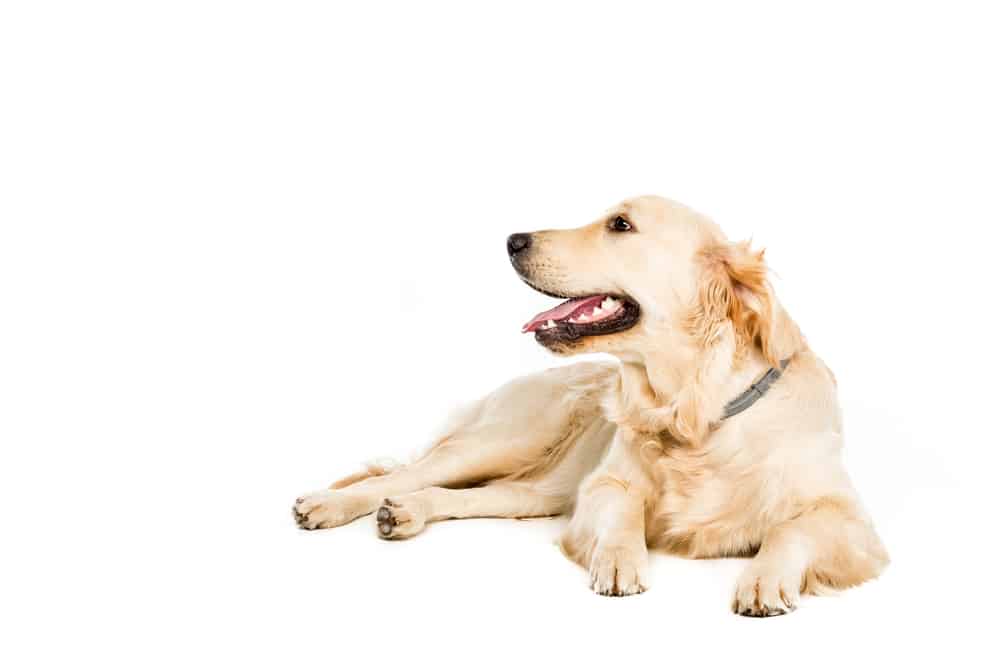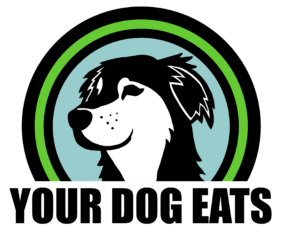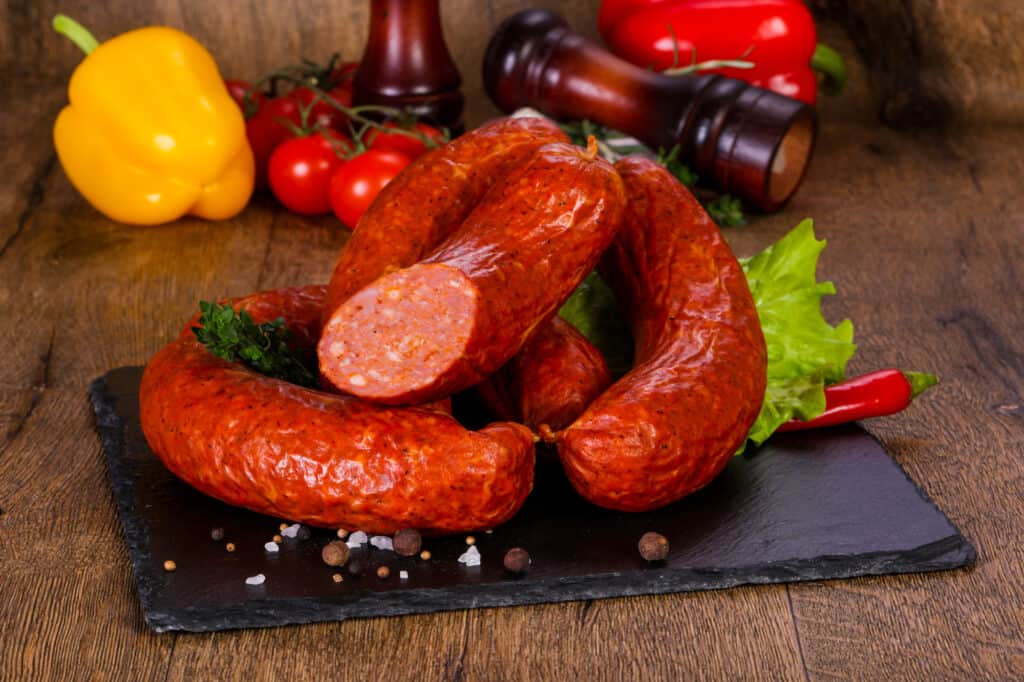Canine companions love to snack on almost anything they find around the house: socks, food scraps from the trashcan, leftover bones…you name it. If your pup recently found their way into some chorizo, it can leave you frantically searching the internet to answer “can dogs eat chorizo?”.
Chorizo is not recommended for dogs, as it may contain toxic seasonings and high sodium levels. While a bite or two of cooked chorizo is probably not going to cause severe harm, it’s still worth being aware of the risks and contacting your vet with any questions.
This post was reviewed for veterinary accuracy by Cara Wright, DVM. For more information about our review process, please visit the About Us page. This article is for informational purposes only and should not be a substitute for professional veterinary help.
What is chorizo?
It’s helpful to understand what chorizo is when assessing the risk to dogs. Chorizo is a type of pork sausage typically seasoned with paprika, garlic and other spices. It’s common in Spanish and Portuguese cuisines, among others, and may be eaten as a main dish with rice, potatoes, eggs and other ingredients.
You can find both fresh and cured chorizo. Cured foods are cooked and then dried to preserve the flavor.
Can dogs eat chorizo?
Chorizo is not a recommended food for dogs. A few bites of cooked chorizo which does not contain any toxic spices is unlikely to be harmful for your dog, but may cause some stomach upset. However, larger amounts can be dangerous, especially when the chorizo contains spices that are harmful to dogs or high levels of sodium. Uncooked chorizo is not recommended at all, as it can cause a parasitic infection.
Risks of cooked chorizo for dogs
Here are some of the risks when it comes to cooked chorizo:
Toxic spices.
While cooked pork itself is not dangerous for dogs, the seasoning in chorizo may be a concern. For example, onion and garlic (fresh or powdered) may be used in chorizo, and are both unsafe for dogs.
Garlic and onion come from the same family of plants called the Allium family. All plants in this family (garlic, leeks, shallots, onions, etc) contain a group of chemicals called sulfoxides and aliphatic sulfides, which are toxic to dogs. These compounds can damage red blood cells and cause anemia.
According to experts, symptoms of toxicity include gastrointestinal issues at first, like vomiting, diarrhea, and loss of appetite. After a few days, dogs may show symptoms associated with the loss of red blood cells, like rapid breathing, fatigue, pale mucous membranes, or rapid heart rate.
Research suggests that 15 to 30 g/kg of fresh onions causes toxicity in dogs. However, dried onions and onion powder are more concentrated and would likely have a lower threshold.
No specific amount has been identified for garlic, though researchers think it may be less potent compared to onions. Nevertheless, it’s wise to avoid feeding your dog either of these ingredients.
While a few bites of chorizo are likely under the threshold for severe side effects, it’s still recommended you do not let your dog eat this.
Gastrointestinal upset.
Even if your brand of chorizo does not contain garlic and onions, it can still cause some digestive distress in some dogs due to the high fat content, other spices, and (in cured meats) nitrates. Dogs with sensitive stomachs may experience diarrhea or vomiting after consuming chorizo, especially when consumed in large amounts.
While these symptoms are typically mild and not serious in most cases, some dogs have had allergic reactions or other issues when eating chorizo. If any symptoms continue after a day or two, it is best to consult with a veterinarian about other possible causes of these issues like dietary sensitivity or illness.
High in sodium.
Chorizo is typically made with a lot of salt. Too many high sodium foods are not recommended in a dog’s diet.
That said, true hypernatremia – or excessive blood sodium levels – are rare for most dogs, but can happen as a result of eating excessive amounts of highly salty products like cooking salt, rock salt, or homemade play dough.
According to the textbook Small Animal Toxicology, signs of salt poisoning can occur as low as 2 grams per kilogram of body weight. For example, if you had a very small four-pound dog (1.8 kg), signs of salt poising could occur starting around 3.6 grams of sodium.
A link of chorizo usually contains about 790 mg sodium (according to the USDA). As such, eating more than four links at a time would risk salt poisoning for a very small dog, as it would start coming close to that 3.6 grams. (Larger dogs would have more tolerance before salt poisoning would occur).
This scenario would be fairly unlikely, but still – it’s wise not to give your dog too many salty foods. Avoid chorizo for this reason.
Risk of undesired weight gain.
Just like humans, dogs can put on weight if they eat too many calories from nutrient-poor choices. Chorizo is naturally calorie dense, and while it does provide protein (important for dogs) – it’s also quite high in fat. Too much table food like this can lead to weight gain in your dog, especially when combined with a dog’s natural tendency towards overeating it.

Risks of uncooked chorizo for dogs
It’s also important to remember that while a little bit of cooked chorizo (without garlic or onion) may not be overly risky, you should not feed your dog uncooked chorizo.
Uncooked pork can contain microscopic parasites called Trichinella. Trichinella can be killed by thorough cooking, but uncooked or undercooked pork can lead to an infection with these parasites called trichinellosis (or trichinosis).
Initial symptoms of this infection usually gastrointestinal upset. As the parasites make their way into the dog’s muscles, muscle pain, swelling, or stiffness can occur.
Luckily, most infections in dogs tend to be mild. Some dogs may not experience any outward symptoms, but some may have symptoms that become concerning. Depending on the severity of the symptoms and infection, anti-parasitic medications may be used to treat a dog with this condition.
To reduce your dog’s risk of this infection, avoid leaving raw cuts out on the counter unattended where they can be eaten by your curious canine pal, and always cook pork thoroughly. (This is important for humans too, as humans are at greater risk of severe disease from Trichinella compared to dogs).
A Final Word from Your Dog Eats
Chorizo is not recommended for dogs, since it can cause gastrointestinal upset and may contain harmful spices. That said, a few bites of cooked chorizo that does not contain garlic or onion powder should not be significantly harmful for your pup. However, if your dog has eaten any large quantities of this sausage recently (especially if it did contain garlic or onions), or if your dog got into uncooked pork, contact your veterinarian for guidance.

